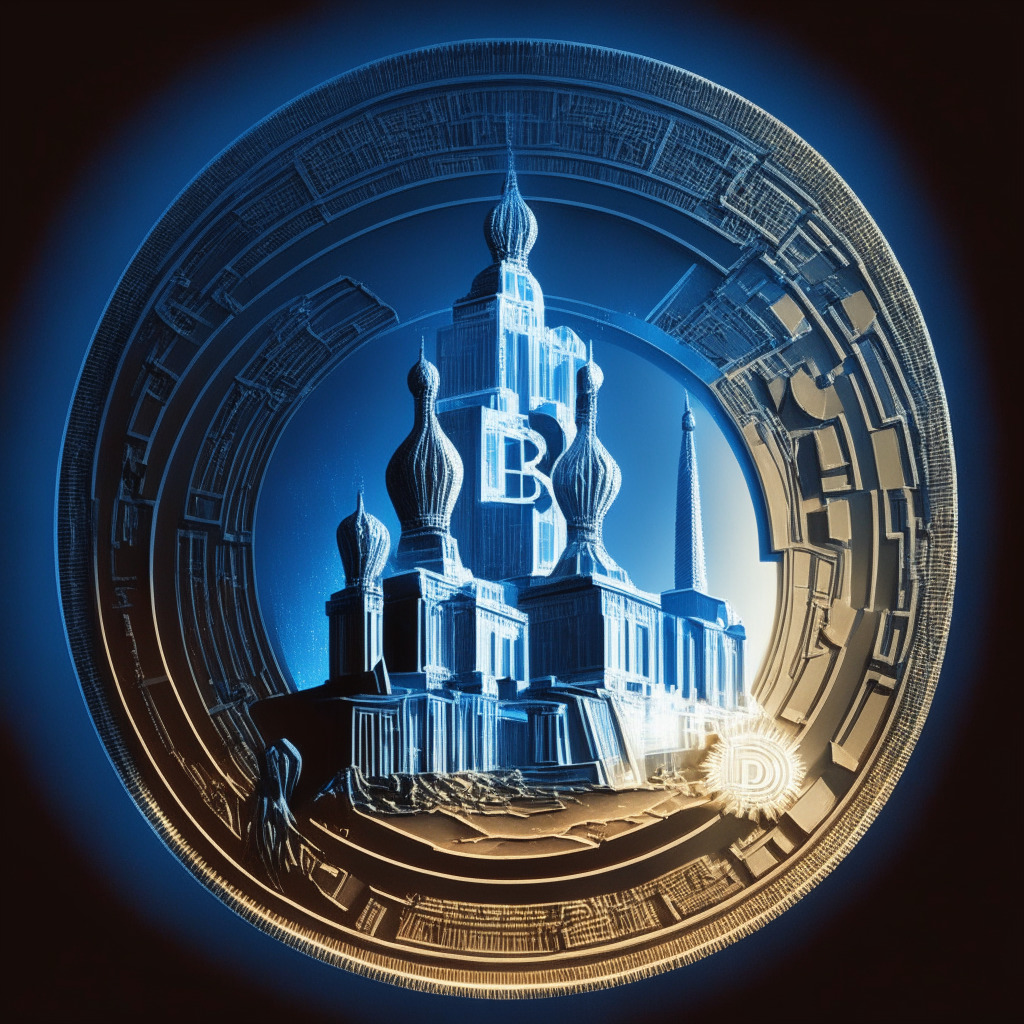“Binance’s Russian users are progressively moving to new platforms including CommEx and ByBit, evident from decreased p2p transactions. While the migration is linked to US regulatory pressures, the change may indicate a strategic rebranding for more compliant user interaction in crypto market scenarios.”
Search Results for: Russia
Russian Firms Take Leap into Future with Adoption of Digital Ruble
Russian firms are adopting the central bank digital currency (CBDC), the digital ruble. Sirius Innovation Science and Technology Center and Rostelecom are pioneering this journey with their digital wallets, highlighting the practical application of this currency. However, this new model poses challenges for traditional financial institutions, and concerns remain about security and potential economic disruption.
Russian Legislator Predicts Global Foray of Digital Ruble by 2025, Possible Shift in International Trade
A high-ranking Russian legislitor, Anatoly Aksakov, predicts that domestic corporations will utilize the nation’s digital ruble, a Central Bank Digital Currency (CBDC), by 2025, especially in Latin American nations. He also suggested potential usage could transform “mutual settlements” among these nations.
Unveiling the Shadows: Binance Russia’s Acquisition by CommEx Raises Intriguing Questions
Binance Russia has been acquired by an obscure firm, CommEx, whose owners’ identity remains a mystery. However, CommEx has been busy building its platform independently while employing several ex-Binance staff. The debate about the real ownership of CommEx continues to heat up due to their adamant secrecy.
Exploring Russia’s Pivot to Crypto: Boosting Trade Ties or Cannibalizing Traditional Banking?
Russian entrepreneurs aim to use “digital assets” and a “unified digital currency” for trade with BRICS and other nations. The idea of utilizing digital financial assets (DFAs), which may encompass digitized commodities, CBDCs, digital securities, cryptoassets, and stablecoins, in international payments is garnering attention. The possibility of creating a unified digital currency for cross-border transactions is also being evaluated.
Unveiling the Truth: Binance CEO Denies Ownership Claims of CommEX Amidst Russian Expansion
“Binance CEO, Changpeng Zhao, has denied ownership of the new digital asset exchange CommEX, which recently assumed control over Binance’s Russian operations. Despite similarities between the platforms and rumors, Zhao assures no personal or proxy ownership exists between him and CommEX.”
Binance’s Exit and CommEx’s Entrance: The Mysterious Shift of Crypto Operations in Russia
“Binance has exited Russia, selling to newcomer CommEx. Despite little detail about CommEx’s origins, it is registered in Seychelles serving CIS and Asian clientele. Its initial focus is on P2P transactions in Russia with goals to rapidly expand as a cryptocurrency exchange.”
Binance Sheds Russian Operations: A Smooth Transition or Stumbling Block for Global Crypto?
“Binance, a leading cryptocurrency exchange, has sold its entire Russia business to CommEX. Its chief compliance officer states operating in Russia wasn’t in line with Binance’s compliance strategy. Similarly, the Swiss bank, Hypothekarbank Lenzburg now trades digital securities types on the blockchain-rooted platform, SDX.”
Diving into Russia’s Digital Ruble Debate: Opportunity or Devastating Risk?
“Russia’s active consideration of a Central Bank Digital Currency (CBDC) is encountering challenges including potential rate increases and withdrawal of major backers. Despite concerns, observers remind that cautious innovation is needed as the future of money moves increasingly towards digitization.”
The Digital Ruble: A Splash in the Global Financial Landscape or Russia’s Field to Plow?
“Russia’s Central Bank Digital Currency (CBDC) – the digital ruble – can play a significant role in curbing black market dollar trading, says former government official, Sergei Kalashnikov. It could minimize the chance of official currency entering the black market, adjust ruble’s value and impact dollar’s growth against it.”
Exploring the Probability of Marking Digital Ruble Tokens: A Double-Edged Sword for Russian CBDC
The Russian Central Bank potentially explores “marking” digital ruble tokens to track CBDC transactions, allowing close monitoring of funds usage. This suggests super-traceable tokens could be a reality soon, although there are cautionary notes around the required balance between regulation and autonomy in digital currency.
Navigating Digital Ruble Tokens: Russia’s Potential Game-Changer with Associated Risks
The Central Bank of Russia has limited digital ruble wallets to a maximum of 300,000 rubles per month to maintain market stability. However, suggestions have been made to remove this cap for non-Russian investors to facilitate foreign investment in Russia and simplify the purchase of Russian digital financial assets. This decision reflects the growing adoption of digital currencies globally.
Crypto Mining Boom in Russia: A Double-Edged Sword with an Environmental Impact
An illicit cryptocurrency miner in Russia’s Far East allegedly stole $225,000 in electricity, causing major harm to a local grid. Such unauthorized access for mining is harmful to power networks, leading to heavy penalties. This incident underscores the increasing issue in the crypto mining space of unauthorized electricity consumption by illicit miners, posing threats to energy grids and overall security.
The Emerging Digital Ruble: Potential Transformation in Russia’s Banking Landscape
Anatoly Aksakov, head of Russia’s State Duma financial committee, predicts a reduced role for traditional banks as the Central Bank Digital Currency (CBDC), the digital ruble, gains adoption. Aksakov urges banks to align their infrastructure with blockchain technology to leverage CBDC’s financial capabilities.
Transforming Banks: How Russia’s Digital Ruble May Redefine Traditional Banking Structures
Anatoly Aksakov, head of Russia’s parliamentary financial committee, suggests a future where blockchain and Central Bank Digital Currencies (CBDCs) could erode traditional banking structures, with the digital ruble leading the way. Banks risk being marginalized unless they adapt to this new digital financial landscape.
Future of Transactions: A Russian Salon Charts New Course with Digital Ruble Payment
A beauty salon in Yekaterinburg, Russia, recently accepted its first digital ruble payment, pioneering the use of Russia’s Central Bank Digital Currency (CBDC) in the commercial sector. This case has sparked optimism that digital currency could offer unique payment solutions, even in areas with limited or no internet access.
Digital Ruble Trial: Unveiling Russian Banks’ Apprehensions and Expectations
In a climate of anticipation, Russian banks, including Sberbank and Tinkoff Bank, express apprehension towards Central Bank’s digital ruble trial. With last-minute exist from the pilot and hesitation from the Association of Banks of Russia (ASROS), questions emerge about the future of Central Bank Digital Currency (CBDC) ahead of a substantial meeting.
Binance’s Existential Crisis: Will the Crypto Giant Exit Russia Amidst Growing Legal Woes?
“Binance, the leading crypto exchange, is considering an absolute exit from Russia amid increasing Western sanctions. This comes after allegations of enabling transactions related to sanctioned Russian banks, escalating global legal issues, and potential indictments for possible infringement of anti-money laundering laws.”
Decentralization Versus Sanctioned Russian Banks: The P2P Dilemma in Crypto Exchanges
Crypto exchanges including OKX and Bybit have delisted Russian banks Tinkoff and Sberbank, due to Western sanctions following the Ukraine invasion. Despite this, the decentralized nature of P2P transactions makes complete enforcement challenging. The delistings highlight the growing reliance on cryptocurrencies amid Russia’s economic instability due to these sanctions.
Binance Regulations and Its Impact on Russian Cryptocurrency Traders: An Analytical Perspective
“Binance introduces new P2P trading restrictions specifically targeting its Russian clients, limiting them to only using the Russian ruble. While narrowing choices, this strengthens local control over RUB in the Russian crypto sphere. However, Russians abroad face difficulties as their usage of other currencies has been banned on the platform.”
Removing Sanctioned Russian Banks from Crypto Exchanges: A Double-Edged Sword for Global Compliance
Crypto exchanges OKX and ByBit have excluded sanctioned Russian banks, including Tinkoff Bank and Sberbank, from their payment options. Despite their removal, private transactions through these banks continue. The development highlights the friction between user services and adhering to international financial regulations in the crypto industry.
Digital Ruble Scams Surge in Russia: A Cautionary Tale for the Global CBDC Movement
Scammers capitalizing on Russian citizens’ unfamiliarity with the Central Bank Digital Currency (CBDC) or digital ruble, are sending false emails and directing individuals to phishing sites to steal personal and financial data. The lack of understanding around CBDCs potentially hampers the digital ruble’s mass adoption, highlighting the need for comprehensive education.
Binance and the Minefield of Sanctions: Navigating the Russian Crypto Landscape
“Binance is under scrutiny for potential ties with five sanctioned Russian banks, raising questions about compliance and potential sanctions violations. Critics claim Binance facilitated ruble trades and peer-to-peer transactions with these banks. However, Binance denies these allegations, stressing adherence to international sanctions rules.”
Binance’s Russian Rumble: Gearing Crypto Towards Regulatory Compliance or Decoupling From Traditional Bank Partners?
“Binance terminated its relations with five Russian banks amidst a system upgrade aimed at strengthening compliance with regulatory norms. This move brings into question the reliability of digital currencies as a stable transfer medium, highlighting the often complicated relationship between cryptocurrencies, regulatory compliance and traditional banking systems.”
Testing the Digital Waters: Russia’s Central Bank Propels CBDC Projects Amid Skepticism
“The Russian banks MTS and PSB are testing the digital ruble, aiming for a national rollout between 2025-2027. With real-world applications like PSB’s digital wallet and promising transaction fees, skepticism still surrounds the quick adoption of this Central Bank Digital Currency (CBDC).”
Unraveling Russia’s Digital Ruble: Combatting Corruption or Dodging Sanctions?
“The adoption of blockchain technology, like Russia’s digital ruble, offers potential to combat corruption by shrinking the shadow economy. It provides transparency in transactions and the possibility of reducing grey economy risks. Special offline wallets also allow it to reach areas where the internet hasn’t yet penetrated.”
Riding the Digital Wave: Russia’s Imminent Launch of the Digital Ruble and Its Implications
“Russia prepares to pilot the digital ruble, with the coin possibly acting as a payment method for state benefits. Initial trials will test micropayments, wallet top-up features, and direct debiting. Doubts persist, however, as some banks have inexplicably withdrawn from early pilot stages, casting uncertainty over the future of Russia’s digital ruble.”
Digital Rubles in Russia: Exploring the Future of Transit Payments with Blockchain
Russia’s Central Bank is launching a digital ruble pilot project, starting from August 15, involving smaller retailers across 11 cities. This digital finance experiment aims at integrating the digital ruble into the Moscow Metro system, offering passengers the ability to pay through digital wallets or purchase smartcards using the digital ruble. Despite challenges, the Russian Central Bank remains confident about this futuristic transaction method.
Unfurling the Future of Finances: Russia’s Digital Ruble Takes the First Leap
Russia is set to launch a pilot program for its digital ruble with 600 participants and 30 retailers. This Central Bank Digital Currency (CBDC) initiative follows China’s digital yuan strategy and could see the digital ruble in active use by 2025, transforming the country’s financial landscape. The token has potential for making and receiving cross-border payments.
Gearing up for the Digital Ruble Era: Russia’s CBDC Revolution Amid Economic Sanctions
Russia’s central bank digital currency (CBDC), the digital ruble, is entering a testing phase with real-world trials through 13 banks. This advancement could potentially sidestep Russia’s current financial challenges and reshape the nation’s digital currency future, despite risks such as cyber threats and potential declines in physical currency demand.
Distrust and Hesitation: Russia’s Digital Ruble Faces Uphill Battle with Skeptic Population
The launch of the digital ruble, Russia’s Central Bank Digital Currency (CBDC), faces opposition and skepticism among its own population. Currently being tested, it is yet to find widespread acceptance. According to a survey, only 13% of respondents intend to utilize it, and 32% are convinced that it’s some form of fraud. The Central Bank now faces the challenge of winning citizen trust.
Navigating the Digital Ruble: Russian Banks Seek Clarity Amid Crypto Confusion
The Association of Russian Banks (ARB) is seeking clarity from Russia’s Central Bank on the eminent launch of Central Bank Digital Currency (CBDC), or digital ruble. In response to rising citizen apprehension, ARB is lobbying for specific regulations, such as prohibiting forced creation of digital ruble wallets and caps on digital ruble operator tariffs. However, ambiguity abounds regarding CBDC’s definition and potential global compatibility.































